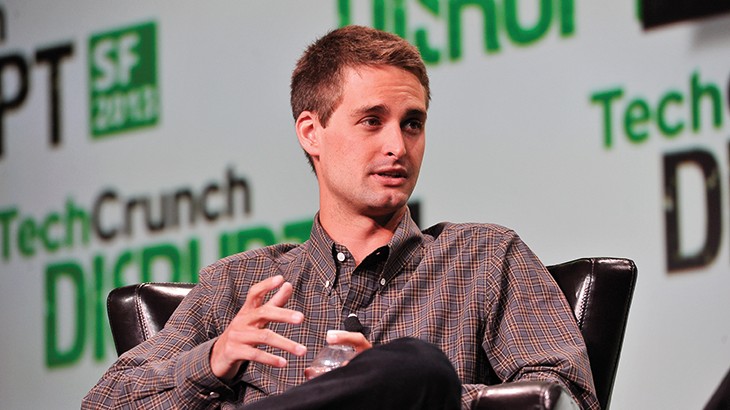
` Evan Spiegel, 26
Snapchat
The cofounder of Snapchat figured out that people wanted something different from social media.
At the center of Snapchat—the disappearing-photo social network valued at $20 billion, used by 150 million people—sits an exotic-car-driving, engaged-to-a-supermodel 26-year-old genius. Or jerk. Or both—it’s hard to tell. Evan Spiegel is kind of a recluse. The guy behind this new media empire follows only about 50 people on the mobile app he helped create. (One of them is the magician David Blaine.) He declined to speak to me, which is fitting, because what Snapchat is, what Spiegel understands better than anyone, might be the opposite of an interview with a magazine.
Snapchat is often compared to Facebook, and Spiegel to Mark Zuckerberg. Which makes sense, especially since Facebook tried to buy Snapchat for $3 billion before releasing its own knockoff versions that promptly fell into irrelevance. And both founders are college dropouts (Spiegel from Stanford, Zuckerberg from Harvard). But Facebook is a company built on making your personal data public and delivering targeted ads; the whole point of Snapchat is to delete your images or videos after you send them to your friends. Snapchat, Spiegel has said, is based on the idea that “ephemeral should be the default.”
In its six years of existence—an epoch in startup time—the company has outlasted rivals like Poke and Ansa and Gryphn and Vidburn and Clipchat and Efemr (I swear I’m not making these up) and Wink and Blink and Frankly and (I promise you) Burn Note and Glimpse and Wickr. It reaches 41 percent of U.S. 18- to 34-year-olds every day and generates revenue from media companies and advertisers that publish snaps in dedicated channels. What did Snapchat do right that others didn’t? One thing you immediately notice upon downloading the app is how much it requires of you. You can’t just sit back and watch—you, too, must snap. The home screen practically begs you to take a picture or shoot a video. Photography once was all about capturing a moment forever; Spiegel’s great insight was that now the best way to make people pay attention is to capture that moment, share it, and watch as it disappears.
—Ryan Bradley
